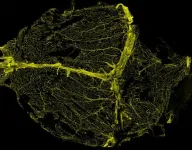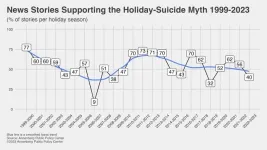(Press-News.org) Two new studies led by researchers from the UCLA Jonsson Comprehensive Cancer Center give insight into how cells use energy to influence the way prostate tumors survive and grow — advancements that can help explain why some prostate cancers become resistant to hormone therapy, the most commonly used treatment for men with advanced stages of the disease.
Hormone therapy, also known as antiandrogen therapy, plays a crucial role in temporarily halting the growth of prostate cancer cells. Over time, however, the majority of patients eventually see their cancer return and progress, underscoring the pressing need for continued advancements to enhance clinical outcomes.
“Identifying metabolic alterations and understanding patterns in cancer cells could be a critical component to developing new cancer treatments,” said Andrew Goldstein, associate professor of molecular, cell and developmental biology and urology at the David Geffen School of Medicine at UCLA and member of the UCLA Jonsson Comprehensive Cancer Center. “New technological advances are giving us insight into actually how these tumors are breaking down their nutrients — known as cancer metabolism — to help them grow. And we might be able to harness or exploit that biology to make tumors more treatable.”
Metabolic insights reveal treatment sensitivity and resistance pathways
In the first study, published today in Nature Cell Biology, the team of investigators identified a specific process in prostate cells that helps determine how they evolve from one type of cell to another, which plays a crucial role in determining a response to treatment.
There are two types of cells in the prostate: basal and luminal cells. Whether cancer initially starts in a basal cell or a luminal cell, it almost always takes on the properties of luminal cells as the cancer grows. But over time, and in response to treatment, some tumors become less luminal. When a tumor is very luminal, it is more treatable using hormone therapy. And when it's less luminal, it's less treatable and more resistant, noted Goldstein, who is the senior author of the study and a member of the Eli and Edythe Broad Center of Regenerative Medicine and Stem Cell Research at UCLA.
While studying this process, researchers saw that when basal cells transform into luminal cells, the way they process a molecule called pyruvate changes. These changes in metabolism can influence the “genetic instructions” within the cells that determine how they develop and respond to treatment.
The team discovered that blocking a specific part of cell metabolism, called the mitochondrial pyruvate carrier, and adding a substance called lactate can change the cell behavior. These changes could potentially affect the success of treatments for prostate cancer, especially those targeting the androgen receptor, a key player in prostate cancer growth.
Additionally, altering how cells use a substance called lactate can cause significant changes in how the DNA is organized in the cells, affecting which genes are turned on or off.
“The study highlights the importance of considering how altering cell metabolism could impact prostate cancer and its response to treatment,” said first author of the study Jenna Giafaglione, a graduate student in UCLA’s Molecular Biology Interdepartmental Program and member of the Goldstein lab as well as the lab of Paul Boutros, director of cancer data science at the UCLA Jonsson Comprehensive Cancer Center. “If we know that certain aspects of metabolism are promoting a resistant phenotype, then we can go after new targets in those resistant tumors.”
MYC protein identified as key regulator
The second study, published in the journal Cell Reports, sheds new light into how prostate cancer cells react when the androgen receptor pathway is blocked, which is a common approach in treating advanced prostate cancer.
To understand what happens to the cell's energy production and usage in response to this blocking, Goldstein and his team looked at how the cancer cells change the way they produce energy. They found that cells start out depending on a type of energy inside the mitochondria, pinpointing certain molecules and processes within the cell that control these changes.
One important protein in this process, called MYC, was found to be the critical regulator of the behavior. Specifically, they saw that if MYC activity decreases as a consequence of the therapy, then these cells seem to become very reliant on their mitochondria to survive. If MYC does not go down, then the cells are much more resilient and resistant to therapy, and not reliant on their mitochondria. Boosting MYC activity reversed the changes in energy production, making the cancer cells less sensitive to certain inhibitors.
“This study teaches us about treatment response and also suggests that if we could find the right combination of therapies, for example, to use hormone therapy initially, and then to use some kind of secondary therapy that influences the mitochondrial behavior, we might be able to reduce disease progression and recurrence,” Goldstein said.
Taken together, the new studies demonstrate a need to further study the link between metabolism and treatment resistance or treatment response. Understanding and controlling these changes could potentially help develop better treatments for prostate cancer.
Funding: The study appearing in Nature Cell Biology is supported in part by grants from National Institutes of Health, the UCLA Prostate Cancer Specialized Programs of Research Excellence (SPORE), The American Cancer Society, the U.S. Department of Defense and the Hutton Family Foundation.
Other UCLA authors include: Preston Crowell, Amelie Delcourt, Takao Hashimoto, Sung Min Ha, Aishwarya Atmakuri, Nicholas Nunley, Rachel Dang, Mao Tian, Johnny Diaz, Marie Payne, Neil Lin and Paul Boutros.
Funding: The study appearing in Cell Reports is supported in part by grants from National Institutes of Health, the UCLA Prostate Cancer Specialized Programs of Research Excellence (SPORE) and the Doris Duke Charitable Foundation.
Other UCLA authors include: Preston Crowell, Jenna Giafaglione, Anthony Jones, Nicholas Nunley, Takao Hashimoto, Amelie Delcourt, Anton Petcherski, Raag Agrawal, Matthew Bernard, Johnny Diaz, Kylie Heering, Rong Rong Huang, Nedas Matulionis, Huihui Ye, Heather Christofk, Matthew Rettig, Robert Reiter, Paul Boutros, Orian Shirihai and Ajit Divakaruni.
END
Studies help explain why some prostate cancers become resistant to hormone therapy
UCLA-led research lays the groundwork for developing improved therapies for treatment-resistant prostate tumors
2023-12-04
ELSE PRESS RELEASES FROM THIS DATE:
Hard to drug: Protein droplets reveal new ways to inhibit transcription factors in an aggressive form of prostate cancer
2023-12-04
Many of the most potent human oncoproteins belong to a class of proteins called transcription factors, but designing small molecule drugs that target transcription factors is a major challenge.
An international team of researchers from the Institute for Research in Biomedicine (IRB Barcelona), the Max Planck Institute for Molecular Genetics (MPIMG), BC Cancer (University of British Columbia) and other institutions has discovered a potential way to target the androgen receptor, the most prominent oncogenic transcription factor in prostate cancer, based on its propensity to form droplets also known as condensates.
The results described ...
MD Anderson’s Katy Rezvani, M.D., receives 2023 Honorific Award from the American Society of Hematology
2023-12-04
Katy Rezvani, M.D., Ph.D., professor of Stem Cell Transplantation & Cellular Therapy at The University of Texas MD Anderson Cancer Center, has been honored with the E. Donnall Thomas Lecture and Prize from the American Society of Hematology (ASH) for her groundbreaking research to develop and advance innovative cell therapies for cancer using natural killer (NK) cells.
“I am fortunate to be able to engage in research that I am passionate about, to mentor incredible young scientists, and to collaborate with a remarkable team of researchers and clinicians. But most importantly, I am blessed to have the opportunity to undertake research that has the potential to ...
Salty immune cells surrounding the brain linked to hypertension-induced dementia
2023-12-04
A study supported by the National Institutes of Health suggests that the response of immune system cells inside the protective covering surrounding the brain may contribute to the cognitive decline that can occur in a person with chronic high blood pressure. This finding, published in Nature Neuroscience, may shed light on new ways to counteract the effects of high blood pressure on cognition. The study was funded by the National Institute of Neurological Disorders and Stroke (NINDS), a part of NIH.
“The role of immune signaling in cognitive decline is critically important to understand,” said Roderick Corriveau, Ph.D., program director, NINDS. “These findings offer insight ...
Dark galactic region nicknamed "The Brick" explained with Webb telescope findings
2023-12-04
In a recent study led by University of Florida astronomer Adam Ginsburg, groundbreaking findings shed light on a mysterious dark region at the center of the Milky Way. The turbulent gas cloud, playfully nicknamed “The Brick” due to its opacity, has sparked lively debates within the scientific community for years.
To decipher its secrets, Ginsburg and his research team, including UF graduate students Desmond Jeff, Savannah Gramze, and Alyssa Bulatek, turned to the James Webb Space Telescope (JWST). The implications of their observations, published in ...
Awareness, accessibility, and affordability are crucial for the early detection of thalassemia
2023-12-04
- Interviewing Dr. Androulla Eleftheriou, Executive Director at TIF, and Dr. Zhiyu Peng, Deputy GM at BGI Genomics, Head of the World Hemoglobinopathy Foundation
Thalassemia, a hereditary hemoglobinopathy, occurs in 4.4 out of every 10,000 live births and is prevalent in Mediterranean coastal areas, Africa, the Middle East, Southeast Asia, and southern China.
Screening and antenatal diagnosis reduced the frequency of β-thalassemia in many Mediterranean countries. Focusing on other regions with high thalassemia prevalence, BGI Genomics has launched the Global 2023 State of Thalassemia Awareness Report, covering 1,847 ...
Complications from flu largely preventable with annual flu vaccine
2023-12-04
ARLINGTON, Va., BETHESDA, Md., CHICAGO and DALLAS, Dec. 4, 2023 — During National Influenza Vaccination Week (December 4-8, 2023), leading public health organizations are encouraging everyone to get a flu shot if they have not already done so. The flu is more than an inconvenience: it can lead to hospitalization, worsening of chronic medical conditions or even death. An annual flu vaccine is the best way to help prevent complications from the flu. [1]
The American Heart Association®, the American Lung Association,® the American ...
Soil drought weakens forest microclimatic cooling
2023-12-04
Scientists from Stockholm University have investigated the mechanisms that create cool microclimates beneath forest canopies during warm and dry summer days. The study reveals how canopy shading and water evaporation together create cooler forest microclimates compared to temperatures outside forests. The article is published in Agricultural and Forest Meteorology.
”The findings are alarming in the context of climate change as more frequent and more severe droughts may threaten the cooling functions of forests,” says Caroline Greiser, researcher at the Physical Geography Department, Stockholm ...
Study shows advanced footwear technology positively impacts elite sprint performances
2023-12-04
A scientific study published in PeerJ Life & Environment sheds light on the potential game-changing impact of advanced footwear technology (AFT) on elite sprint performances in track and field. The research, titled "The Potential Impact of Advanced Footwear Technology on the Recent Evolution of Elite Sprint Performances," reveals the significant strides made in sprint performance and suggests that AFT has played a pivotal role in these improvements.
Elite track ...
What's behind the holiday-suicide myth
2023-12-04
PHILADELPHIA – For more than two decades, the Annenberg Public Policy Center has tracked the ways in which news organizations erroneously link the year-end holiday season with suicide, perpetuating the false holiday-suicide myth. But as years of national data show, the winter holiday months usually have low average daily suicide rates, with December the lowest of all.
In our new media analysis, we find that of the newspaper stories during the 2022-23 holiday season that explicitly connected the holidays with suicide, 60% correctly debunked the myth while 40% incorrectly supported it.
But it’s not just the media that ...
More than a meteorite: New clues about the demise of dinosaurs
2023-12-04
What wiped out the dinosaurs? A meteorite plummeting to Earth is only part of the story, a new study suggests. Climate change triggered by massive volcanic eruptions may have ultimately set the stage for the dinosaur extinction, challenging the traditional narrative that a meteorite alone delivered the final blow to the ancient giants.
That’s according to a study published in Science Advances, co-authored by Don Baker, a professor in McGill University’s Department of Earth and Planetary Sciences.
The research team delved into volcanic eruptions of the Deccan Traps—a ...
LAST 30 PRESS RELEASES:
Cal Poly’s fifth Climate Solutions Now conference to take place Feb. 23-27
Mask-wearing during COVID-19 linked to reduced air pollution–triggered heart attack risk in Japan
Achieving cross-coupling reactions of fatty amide reduction radicals via iridium-photorelay catalysis and other strategies
Shorter may be sweeter: Study finds 15-second health ads can curb junk food cravings
Family relationships identified in Stone Age graves on Gotland
Effectiveness of exercise to ease osteoarthritis symptoms likely minimal and transient
Cost of copper must rise double to meet basic copper needs
A gel for wounds that won’t heal
Iron, carbon, and the art of toxic cleanup
Organic soil amendments work together to help sandy soils hold water longer, study finds
Hidden carbon in mangrove soils may play a larger role in climate regulation than previously thought
Weight-loss wonder pills prompt scrutiny of key ingredient
Nonprofit leader Diane Dodge to receive 2026 Penn Nursing Renfield Foundation Award for Global Women’s Health
Maternal smoking during pregnancy may be linked to higher blood pressure in children, NIH study finds
New Lund model aims to shorten the path to life-saving cell and gene therapies
Researchers create ultra-stretchable, liquid-repellent materials via laser ablation
Combining AI with OCT shows potential for detecting lipid-rich plaques in coronary arteries
SeaCast revolutionizes Mediterranean Sea forecasting with AI-powered speed and accuracy
JMIR Publications’ JMIR Bioinformatics and Biotechnology invites submissions on Bridging Data, AI, and Innovation to Transform Health
Honey bees navigate more precisely than previously thought
Air pollution may directly contribute to Alzheimer’s disease
Study finds early imaging after pediatric UTIs may do more harm than good
UC San Diego Health joins national research for maternal-fetal care
New biomarker predicts chemotherapy response in triple-negative breast cancer
Treatment algorithms featured in Brain Trauma Foundation’s update of guidelines for care of patients with penetrating traumatic brain injury
Over 40% of musicians experience tinnitus; hearing loss and hyperacusis also significantly elevated
Artificial intelligence predicts colorectal cancer risk in ulcerative colitis patients
Mayo Clinic installs first magnetic nanoparticle hyperthermia system for cancer research in the US
Calibr-Skaggs and Kainomyx launch collaboration to pioneer novel malaria treatments
JAX-NYSCF Collaborative and GSK announce collaboration to advance translational models for neurodegenerative disease research
[Press-News.org] Studies help explain why some prostate cancers become resistant to hormone therapyUCLA-led research lays the groundwork for developing improved therapies for treatment-resistant prostate tumors





